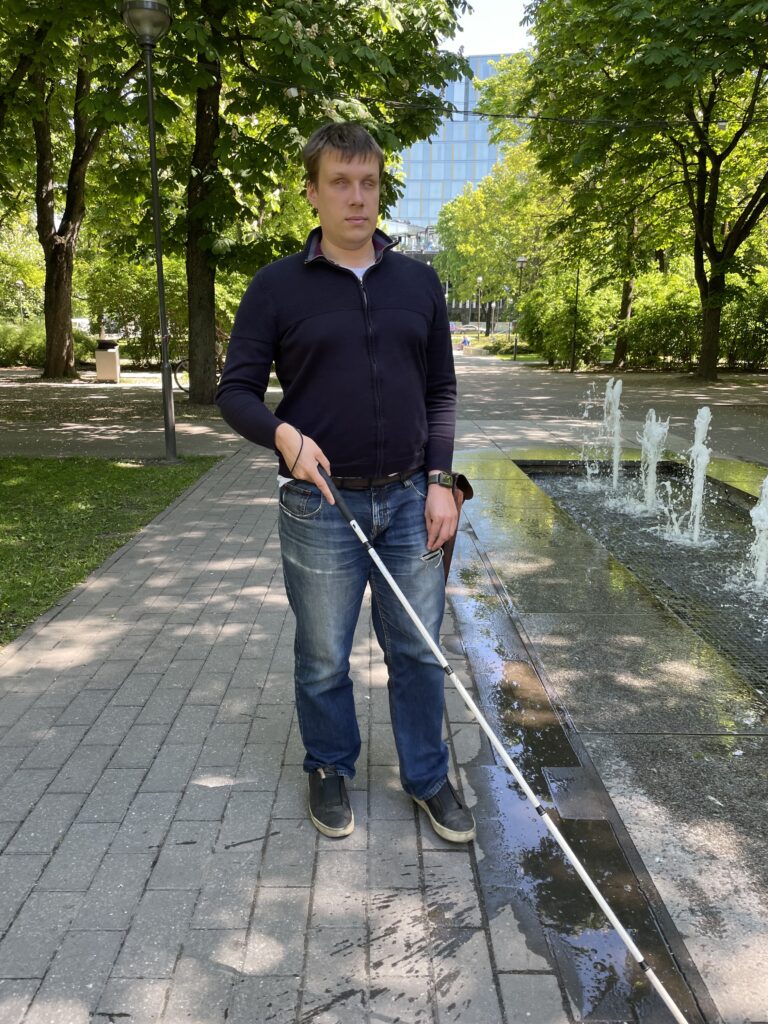02.12.2021
Estonian Blind Union: we are headed towards less differentiated worlds for visually impaired people and others
The Estonian Blind Union is a new member of the Cluster and is set to celebrate its 100th anniversary in December. The Union represents visually impaired people, both blind and partially sighted persons, and fights for their rights at the state level.

“Our wider goal is to make sure the world of the visually impaired is not so different from the world of others,” says Jakob Rosin, Chairman of the Management Board of the Estonian Blind Union (on the photo). According to Rosin, the Union is increasingly involved in providing feedback on bills as well as giving consultations. For example, people turn to the Union to ask for advice on how create websites or study materials that are accessible for all, regardless of disability. “In essence, we act as a bridge between the visually impaired and the state,” says Jakob.
Currently, 17 organisations are members of the Estonian Blind Union. There are around 1500 individuals belonging to these organisations, meaning that the Union has a relatively good network spanning across Estonia. The Union provides ongoing training for its members and introduces them to new solutions and technologies that can be used by visually impaired people. The Estonian Blind Union is in turn a member of the European Blind Union.
Looking for young people
According to Jakob Rosin, one of the concerns the Union will be focussing on in the coming years is how to engage more young people. “Young people don’t find the social sector attractive, but our current community is ageing, so we need to find ways to encourage more young people to join unions and get involved,” says Jakob. “The more people we have talking about the issues faced by visually impaired people, the better things will become.”
Fortunately, people are becoming increasingly aware of issues related to blind and disabled people and according to Jakob, it is crucial that we talk about the fact that these people exist and their interests must be taken into consideration.
The Union also plans to reinforce the rehabilitation network in Estonia. “The current system is relatively complex and we simply want to make it more straightforward. For example, if someone suddenly loses their sight, or if a child is born blind, you have to do quite a lot of digging on how to proceed,” Jakob admits.
Accessibility – not just problematic for disabled people
According to Jakob, accessibility is often thought of as charity and accommodating people with disabilities, but in reality, it concerns all of us. “Accessibility means increased ease of use, and when something is made accessible for people with disabilities, then in reality, everyone benefits,” says Jakob.
He suggests thinking about visiting a website or an online shop. The text or buttons to be clicked on with a mouse or a finger can be quite small. “Doing it at home on a computer or tablet might not be a problem, but imagine you’re on a bus in a rural area in the summer, the bus is rattling and the sun is causing a glare on the screen of your smart device. Those small buttons you need to press then really become almost impossible to see,” says Jakob to illustrate the matter. If a website or an online shop is adapted to accessibility requirements, people who do not have a disability but occasionally need a more comprehensible view can take advantage of this opportunity.
Legislation offers increasingly better support on accessibility – Estonia has several existing laws, and a few in the pipeline, which require certain businesses to focus more on accessibility, both in physical space and online.
Hoping for partners
The Estonian Blind Union recently joined the Connected Health Cluster, led by Tehnopol. According to Jakob Rosin, the main reason for joining the Cluster was to provide advice and support to start-ups. “We can see that many new solutions have the potential to benefit the visually impaired and that these benefits could be taken from Estonia and into the wider world,” he says.
The fact that the Cluster makes it possible to take part in various projects and find partners is no less important. According to Jakob, the third sector, especially undertakings related to people with disabilities, is underfunded by the state and largely operates on a project basis. “The more opportunities we have to get involved in projects, the more ideas we will generate for further development. We see the potential for the wide-based involvement of our community in various undertakings,” adds Jakob.

















